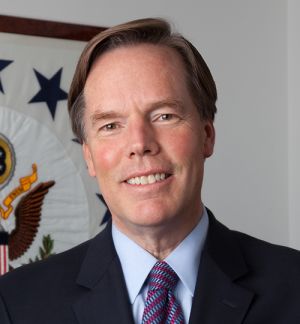Morning Prayers at Harvard University
I would like to begin with a reading from Amos 5, verses 22-24:
“Even though you bring me burnt offerings and grain offerings, I will not accept them. Though you bring choice fellowship offerings, I will have no regard for them.
But, let justice roll down like waters, and righteousness like an ever-flowing stream.”
When Dr. Martin Luther King, Jr. exclaimed that last verse at the height of the struggle for Civil Rights—“Let Justice roll down like waters…”, he challenged Americans to meet the test of whether we will build a world of justice for all of our citizens.
The ideal of a Just World is, of course, one of the greatest, and most elusive, of all human ambitions.
When I last had the privilege of speaking at Morning Prayers in 2012, I asked whether the word “Peace” had effectively disappeared from our political lexicon and national conversation, at a time when many say our highest aim should be security.
I would ask another question on this very cold January morning. Has Justice, the essential companion of peace, also ceased being a singular aim of our democracy in 2014?
I have found in my diplomatic career, and in my teaching here at Harvard, that perpetual peace—between peoples in nearly every culture-- can rarely be achieved if Justice is not its essential foundation.
But, when Justice is present—a commitment to fairness, equity and morality--societies can overcome even the deepest wounds and bridge previously unbridgeable divisions.
Americans understand this vital lesson from the central event in our history.
We did not become a country complete in all its parts until the Civil War when Lincoln and the Union triumphed over the southern rebellion, its lamented Confederacy and the evil of Slavery.
But, even at the end of that tumultuous conflict, African-Americans were not awarded the Justice that was their right until a century later with the passage of the Civil Rights Act of 1964 and the Voting Rights Act of 1965.
From our eighteenth century founding until just a half century ago, we were a wounded, fractured and unjust society so long as the “original sin” of our Constitution, as Condoleezza Rice has called it, was not extinguished.
As we look at the United States today and the world beyond, where is justice incomplete or missing altogether?
There is a profound lack of justice in the burning Middle East—a region roiling in civil war and violence three years to the month after the once hopeful Arab revolutions of 2011.
Palestinians have waited for nearly 66 years for a measure of justice—their own state and the freedom to determine their own fate.
Israelis, too, look for justice in a region in which they are still largely unrecognized and unaccepted.
In Syria, nine million of its 22.4 million citizens find themselves refugees, uprooted as they try to flee the savage warfare that has decimated that once great country. Surely, they deserve greater justice.
Women in Saudi Arabia and in other Arab countries have not achieved the just extension of equal rights in any sphere of life.
In East and Central Africa, brutal civil wars in South Sudan, Somalia, the Central African Republic and Congo deprive their people of an elementary form of justice—the right to live a free and normal life.
On every continent, men and women struggle to escape the bondage of injustice from Coptic Christians in Egypt to the Moslem minority in Western China to the millions of Chinese who wish to practice religion freely and to enjoy the rights of free speech and assembly that we are privileged to enjoy here.
But, in our hearts, we also know that Justice is missing here in America when so many of our fellow citizens are poor, or homeless, and deprived of their right to a decent life.
The pursuit and achievement of justice is a necessary precondition for peace in the modern world.
On the eve of the Civil War, a Boston Abolitionist, the Reverend Theodore Parker, had a vision about justice that, a century later, a young Boston-educated preacher used to fuel the great struggle for Civil Rights.
And, in a final fitting tribute, Parker’s words became some of the most iconic and memorable of the 2008 Presidential campaign.
Theodore Parker, Martin Luther King and Barack Obama all believed deeply in Parker’s prophecy that:
“The Arc of the Moral Universe is Long, but it Bends Towards Justice.”
Burns, Nicholas. “The Pursuit of Justice in the World Today.” January 28, 2014


